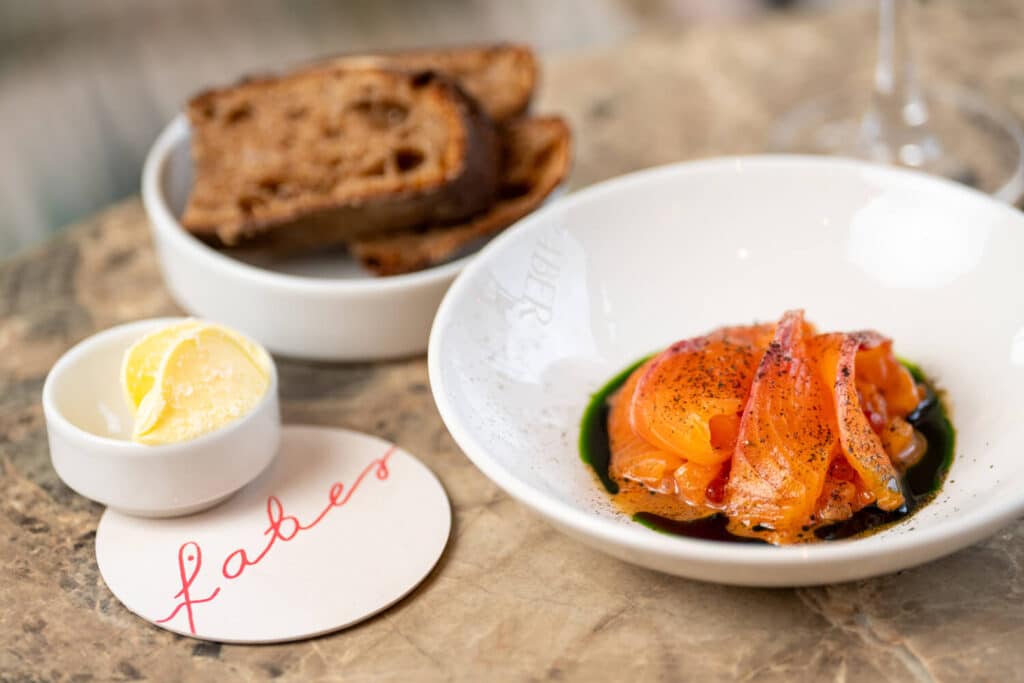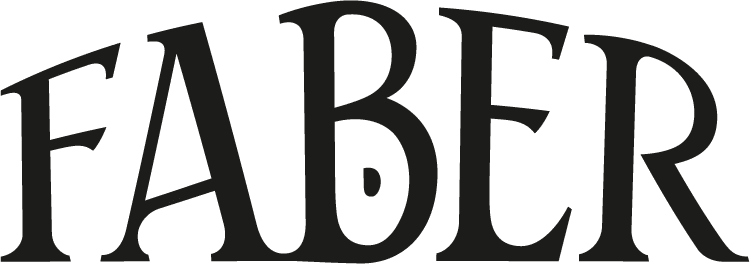![]()

![]()


Our Trout Tartare with Keta Caviar and Horseradish tofu and Parsley sauce has become somewhat of a signature dish here at Faber, one of our best sellers and with a popularity that seems to bring guests back for another bite. But this dish wasn’t just randomly conceived, it was born out of a clear principle to use only the most sustainable ingredients It’s our only Farmed fish and the fact with have it on our menu is testament to how the fish and it’s environment are treated.
From the outset we said we would not put Salmon on our menu, farmed salmon is a big no, no (we’ll go into this more) and the sheer demand for wild salmon only drives populations down and compounds the need for intensive farming techniques. As recently as a few weeks ago the BBC reported concerns about a jail break of farmed salmon (The article) and the impact these escapees will have on the wild population spreading not only disease but also harmful antibiotics that are normally flushed from farmed salmon prior to being sent in a lifeless shrink wrap to supermarkets.
It was only recently that I spoke to some senior faces in the world of fish cuisine about visits to Norwegian salmon farms, it has long been a point of concern. Salmon farming rightly criticised for its significant ecological footprint. The farms can disrupt marine ecosystems, contributing to pollution through the release of waste, uneaten food, and chemicals into the water. This not only degrades water quality but also affects surrounding wildlife, including wild fish populations. The confinement of large numbers of fish in a relatively small space increases the risk of disease and parasites, which can spread to wild fish, further threatening the natural balance. Add to this the reliance on wild-caught fish to produce feed for farmed salmon places additional pressure on already overfished marine species.
Here’s one for you as you munch down on your next supermarket Salmon fillet, that wonderful pink tint it has, that makes it look so tasty and healthy, as it would look in a healthy wild salmon is actually enhanced back into the fish with drugs and feed, without pumping these unwanted substances into the fish it would be presented as grey to you on the plate. This put me off future purchases as well!
Welcome to the stage the humble Rainbow trout and in particular ChalkStream trout, a far more sustainable alternative. Chalk stream trout farming, particularly in the renowned Test and Itchen rivers in the UK, operates with a significantly lower environmental impact. These farms are carefully managed, using fully segregated systems that ensure the surrounding chalk stream environments remain protected. The water used in the farms is constantly monitored and filtered through specially designed settling channels, removing waste before it returns to the rivers. This meticulous process ensures that the water quality remains at Class A standard, comparable to its original state. Such measures starkly contrast with the often problematic waste management systems seen in salmon farming, where the release of pollutants into the sea can be difficult to control.
One of the most impressive aspects of ChalkStream trout farming is its commitment to reducing reliance on marine resources for feed. Over the past decade, the marine content in the trout’s diet has been reduced by over 60%, with the remaining fishmeal sourced from certified sustainable fisheries. This is a critical step towards addressing the overfishing problem, as it takes far less marine-caught fish to produce a tonne of ChalkStream® trout than is required for salmon. By achieving efficient feed conversion rates, the farms not only minimize waste but also position themselves as net producers of fish protein. This efficiency, coupled with good farming practices, significantly reduces the strain on wild fish stocks. Additionally, consuming trout as a source of Omega 3 is far more efficient than relying on fish oil supplements, which divert a significant portion of the world’s fish oil supply away from direct consumption.
And taken from their website some phenomenal credentials. ‘The overall farming practices employed by ChalkStream® trout farms are another reason why this species is a superior alternative to farmed salmon. These farms are certified by GLOBALG.A.P. Aquaculture, a globally recognized standard for responsible farming. This certification ensures that the farms meet rigorous criteria for environmental and ecological care, animal welfare, and food safety. The UK’s QTUK quality assurance scheme further guarantees full traceability from hatchery to processor, ensuring that every step of the production process adheres to the highest standards. Such strict oversight is often lacking in the more industrialized salmon farming sector, where large-scale operations can sometimes overlook these critical aspects in favour of volume production.’
Like all ingredients we use at Faber, sustainably options aren’t about sacrificing quality or flavour in return for a more conscious sustainable option. We believe that with sustainable ingredients can come a superior ingredient, something new, but something incredible. It was a big decision for us to opt to take on a farmed fish but rules can be broken when carefully considered and it’s clearly the right thing to do. Trout will reign long on our menu!
You can order from ChalkStream yourself HERE or we’ll always have some cracking dishes for you to try.
We look forward to seeing you soon!
Here are eight simple yet delicious dressings that pair perfectly with fresh oysters, each designed to complement their natural flavour without overwhelming it.
Read moreThis year, why not surprise your guests with these five exquisite seafood-inspired recipes that are as celebratory as they are delicious?
Read moreAlcohol free cocktails made for all tastes and still using British coastal ingredients.
Read more
